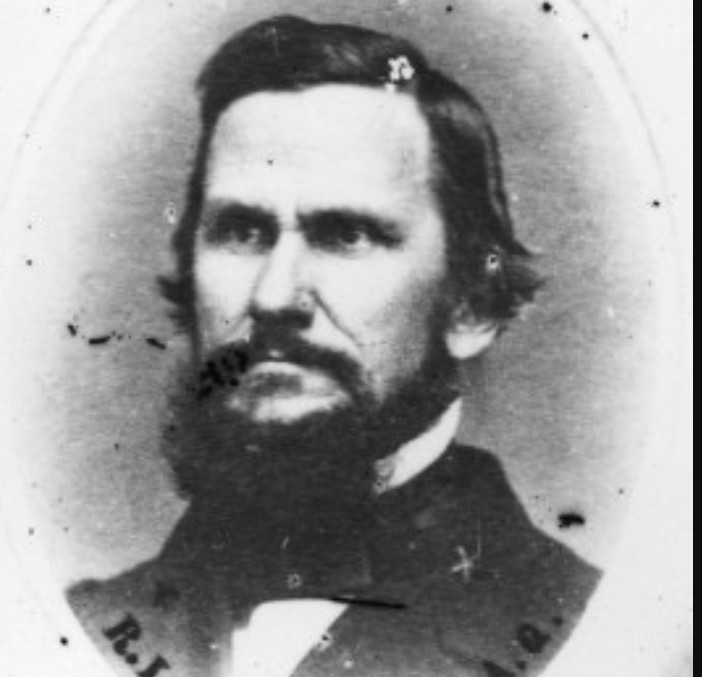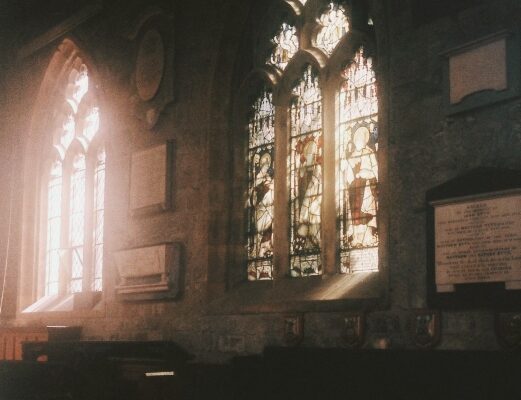The honor guard carrying my grandfather’s coffin continued toward the center of the chapel. The simple things he had taught me through conversations and games started to flood my mind. I could almost predict the rituals that would happen next, and though I had never been here nor seen anything like what was before my eyes, it was all familiar.
The coffin was respectfully placed on a large granite table, flag still draped over it. The table was eight feet long, four feet wide, with a depth of ten inches, engraved around the edges were the last words of one of the saints of our people.
“Let us cross over the river and
rest beneath the shade of the trees.”
My memory triggered, images and sounds of the men that had visited my grandfather flashed and echoed. This saying was the way in which they had always parted from each other, almost in benediction, as if something sacred had taken place. That’s how he was, every interaction was deliberate and purposeful, and all the hurried as he got older.
At the time of his parting, he and his bride had been married 75 years, had seven children, and to date 35 grandchildren, 27 great grandchildren, and six great, great grandchildren. All save two were present, two children already proceeding into glory. Each of them had a personal story to be shared of him, but this was not the time.
Hymns and readings of selected Scripture, and quotes from some of the heroes of our people was the body of the service. There was no eulogy in the traditional sense, no unscripted emotional rambling so common at many modern funerals, no giddy celebration of life. This was a time to mourn. Those assembled had lost something of value, someone precious to them, and it was my grandmother who had lost the most. So, it was left to her to choose who would take up the mantle and join the Circle of the Twelve, for there were always to be twelve.
Early on, during the restoration, within the ranks of the brotherhood, it was determined that the inner circle would represent families, avoiding infiltration and treachery. Therefore, each of the twelve would recruit from within their close familial relationships. Brothers, sons, sons-in-law, and close cousins would become the collective of one hundred and forty-four, and there was a general campaign to have all these families intermarry, solidifying the bonds even more. In the past, the power of real connectionalism had always been the strength of our people, and my grandfather worked tirelessly to reclaim this ancient power.
The herald called for my grandmother to pick from within her clan a replacement for my grandfather, completing the twelve. She called the name of her eldest son; he was the knight that had been guarding the entrance. He was the last of her sons to join the brotherhood, but once awakened, his strength and nobility was apparent to all. Stepping forward, he presented himself before the eleven, bowing down at the front of the table in respect and homage for that which he was being called.
“Are there any objections to our brother taking the sacred vows of our order?” the herald questioned the assembled knights. The chapel was silent in agreement to this choice. Then the herald asked my uncle if he was worthy to take the oath, he exclaimed “No!” This was the proper response, for a knight must act in humility before all, knowing the heaviness of the duty for which he was about to embrace. Therefore, the ritual proceeded.
The herald asked him to repeat a series of vows before all those assembled and requested that none of these vows were to be repeated outside this sacred place. He did this soberly, as he was not only entering into the Circle of the Twelve, but he was acknowledging his patriarchal headship over his clan. Upon this acceptance, the oldest knight walked toward my uncle, drew his sword and knighted him in the name of Saint Andrew, and by the covenant of the Father, Son, and Holy Ghost. He rose and joined the circle to complete the twelve.
Now with the compliment of twelve restored, they encircled the table, swords drawn and raised over the coffin. Suddenly, all one hundred and forty-three knights proclaimed in deafening unison, “Deo Vindice!” (“With God as Our Defender”) and the curtains that had hidden the stained-glass windows in the balcony were flung open, illuminating the chapel in radiant sunlight for the first time. Then, the windows in the lower chapel were uncovered, and the brilliance of every detail of the chapel was amplified! Amplifying emotions to battle fervor among the knights, the herald loudly imparted another translation of the same expression, “God is our Vindicator!” At this, all the knights made their way quickly into the aisles on the main floor of the chapel and assembled by order, by clan.
Precisely at that moment, the questions my grandfather would repeatedly ask came rushing to my recollection, “Who will defend our family?” and “How will your accusers be answered when they revile you falsely?” The answer was always the same, Deo Vindice! Deo Vindice! Deo Vindice! For a moment, I forgot I was at a funeral and wanted to leave my seat, joining the rally of knights surrounding my grandfather, but that changed quickly.
All the knights turned toward my grandmother in respect, but also in truest love, for she was most beloved among them all. One by one, they all began to slowly sing our beautiful anthem, the anthem of our people. Their voices, gentle yet manly, like a cascade of rain falling inside the chapel. My grandmother, who had been stoic until this point, could no longer contain herself, and her grief finally befell her.
The flag draped coffin was now attended to once again, as the guard respectfully and precisely folded our glorious banner. The newest of the twelve was given the honor of presenting our flag, which was to be received by my grandmother. Only the knights were not overcome with emotion at this point, though looking toward my uncles, who were three of the knights, I could tell that their eyes were watering.
The doors of the chapel were opened once again. All were asked to rise as the coffin was again moved, but this time by the whole of the twelve. They raised it high above them and proceeded to exit. The rest of the congregation followed, each according to their clans, each attended to by the knights that represented them within the brotherhood. And as they left, they all sang, “The Son of God goes forth to War,” which was among the favorite hymns of my grandfather.
On the Southern side of the chapel was the tomb in which my grandfather would finally be laid to rest. The coffin was lowered and covered in Carolina jasmine, yellow and beautiful like a South Carolina morning sunrise. My grandmother, along with all her children, touched the coffin one last time, then it was placed and sealed within the tomb.
It was finished, or so I thought…

Service to God and honor to the South.






Wow! What a powerful picture you painted. Would that something that somber and impactful was commonplace in families. Sadly, tradition and honor are no longer valued as they once were. I envy what you have.
Old times here are not forgotten. Thank you.
Tradition is best made in the past, but when none exists, we are free to start a new one.